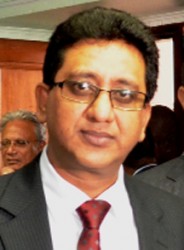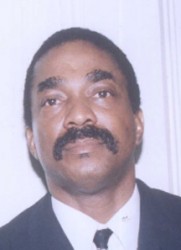Attorney-General Anil Nandlall yesterday argued that the court cannot issue an order to stop all government spending not approved by the National Assembly as requested by APNU leader David Granger as there is no allegation that anyone’s fundamental rights have been breached.
“In this action there is no allegation that anyone’s fundamental rights have been contravened,” Nandlall told reporters after emerging from the in-chamber hearing at the High Court yesterday. He related that he argued that a conservatory order – sought by Granger – is a special type of order that the constitution only allows to be granted when there is an allegation that there is a violation of some fundamental right of the citizenry.
“In fact this is not a case which touches and concerns fundamental rights at all and therefore the wide amplitude of remedies and powers which a court will normally have in an action in which a citizen alleges breach of his fundamental rights, those repertoire of remedies are not available in this type of proceedings,” the Attorney-General (AG) said. He added that it was in this regard that he submitted that the court “really has no power” to grant a conservatory order.
Early in December last year, Granger made an application to the Court for an order to halt any unauthorised spending by the government and also for spending on programmes that were disapproved by the National Assembly to be stopped. His application was the result of concerns raised by the opposition about government spending public monies without any parliamentary scrutiny after Parliament was suspended by President Donald Ramotar on November 10, 2014.


Arguments for a conservatory order until the hearing and determination of the substantive action continued before acting Chief Justice Ian Chang yesterday.
Granger is listed as the plaintiff while Nandlall, Minister of Finance Dr Ashni Singh and Speaker of the National Assembly Raphael Trotman are named as defendants.
Nandlall told reporters that he argued that Singh and Trotman have been wrongly named by Granger. He said that in commencing his arguments, he dealt with many of the issues which have been raised, the main one being procedural deficiencies. According to the AG, he believes that these deficiencies afflict the proceedings which have been filed and, as such, submitted that a conservatory order cannot and should not be granted in proceedings “commenced in this way.” He explained that there is no allegation that anyone’s fundamental rights have been contravened.
Nandlall related too that he submitted that Singh in his capacity as Minister of Finance is misnamed and misjoined as a party to the proceedings. He said that the State Liability Act clearly says that all proceedings against the State should be brought against the Attorney General. “Ashni Singh has been joined as the Minister of Finance in these proceedings,” he noted even as he pointed to a Court of Appeal case in which the AG and a Minister of Trade were sued but the court later struck out the Minister from the case as he was “a party wrongly named under the provisions of the State Liabilities Act which mandate legal proceedings against the State to be commenced against the Attorney General.”
Nandlall said too that Trotman is another party who has been wrongfully named in the action. “Why was the Speaker named as a party? Is the applicant David Granger saying that the Speaker is spending money unlawfully? …Why is he dragged to the court?” he questioned while adding that he made submissions to this effect. “The Speaker has been wrongfully brought to court. No allegations of wrongdoing has been made against the Speaker but yet he is a party,” the AG said.
Nandlall said that when the case continues next week Wednesday he is scheduled to address the constitutional aspect in terms of the statement of excesses and whether the minister acted lawfully, unlawfully, constitutionally or unconstitutionally.
Asked how long the arguments are expected to last before the Chief Justice rules, the AG assured that he would conclude his arguments at the next hearing. He, however, expressed uncertainty as to how long the other side will take to wrap up their response to the submission he made.
Granger’s lawyer Basil Williams later said that his client’s case is very clear: that there is a system of separation of powers meaning that the legislature, the government and the judiciary are independent. “The independent National Assembly disapproved $37 billion of programmes in the budget and the Minister of Finance in breach of doctrine went and spent on those disapproved programsme,” he stressed.
He added that the Minister admitted that he spent and his client fears that “after the 16th of June, where they spent $4.5 billion, they would have continued spending and might have already reached the full $37 billion.” The attorney said that the claim that this matter expired at the end of 2014 is far from the truth.
He explained that government wants to spend for the first four months of this year. “They can only spend for the first four months …based on one twelfth of what was budgeted in 2014. So it must be relevant that they would want to spend the $37 billion which was disapproved in 2015. It must be relevant still because they are limited to spending one twelfth of what was appropriated in 2014,” he stressed. He noted that given what he has explained, the matter “just can’t expire.”
Williams disagreed with Nandlall’s contention that Singh and Trotman were wrongly named in the action. He said that Singh cannot be wrongly named because the constitution refers to the Minister of Finance as the person who must prepare and bring the budget to the Parliament. He added that it was the minister who came to the National Assembly and said that he spent money on the disapproved programsme. “So who do you name,” he questioned before adding that the Speaker was named because he was the person in charge of the House. Williams noted that in a matter such as this, all parties that are relevant have to be named.
Questioned about his confidence in winning the case, Williams responded “we are very confident because Mr. Nandlall argued nothing new today. All he did was argue the same thing that Mr, Chase argued yesterday…” He stressed that this matter should have finished already. “It is a simple order. One, the government coffers are going to be affected. A conservatory order is the important result; to maintain the status quo…by the time the substantive order comes up, we wouldn’t have no money in the coffers anymore,” he said.
Williams stressed that as of now, no one knows how the government is spending. “They have prorogued Parliament and so we cannot exercise our functions of oversight and scrutiny of what the government is doing. So that is why we have this fear, especially with elections in the air, that they would abuse their spending power and spend for purposes of their elections campaign,” he said.
Apart from the conservatory order, Granger is seeking a declaration by the court that the National Assembly lawfully disapproved programmes with allocations totaling $36,756,134,000 for 2014 and that Singh or other ministers designated by the President unlawfully spent or authorised the spending of monies on the programmes, to the tune of $4,553,761,991, for the period ending June 16, 2014.
In addition, he has asked for declarations that the purported spending by Singh or other ministers on the programmes was “unconstitutional, ultra vires, null and void, unreasonable” and in breach of the doctrine of the separation of powers, and that Singh or other ministers cannot lawfully spend or authorise the spending of monies on programmes that have been disapproved or not authorised by the National Assembly.
The action also asks for a declaration that the purported expenditure on the programmes that were disapproved by the National Assembly, cannot amount to a Statement of Excess within the meaning of Article 218 (3) (a) and (b) of the Constitution as well as an order that the classification of the spending under Statement of Excess is unlawful.




